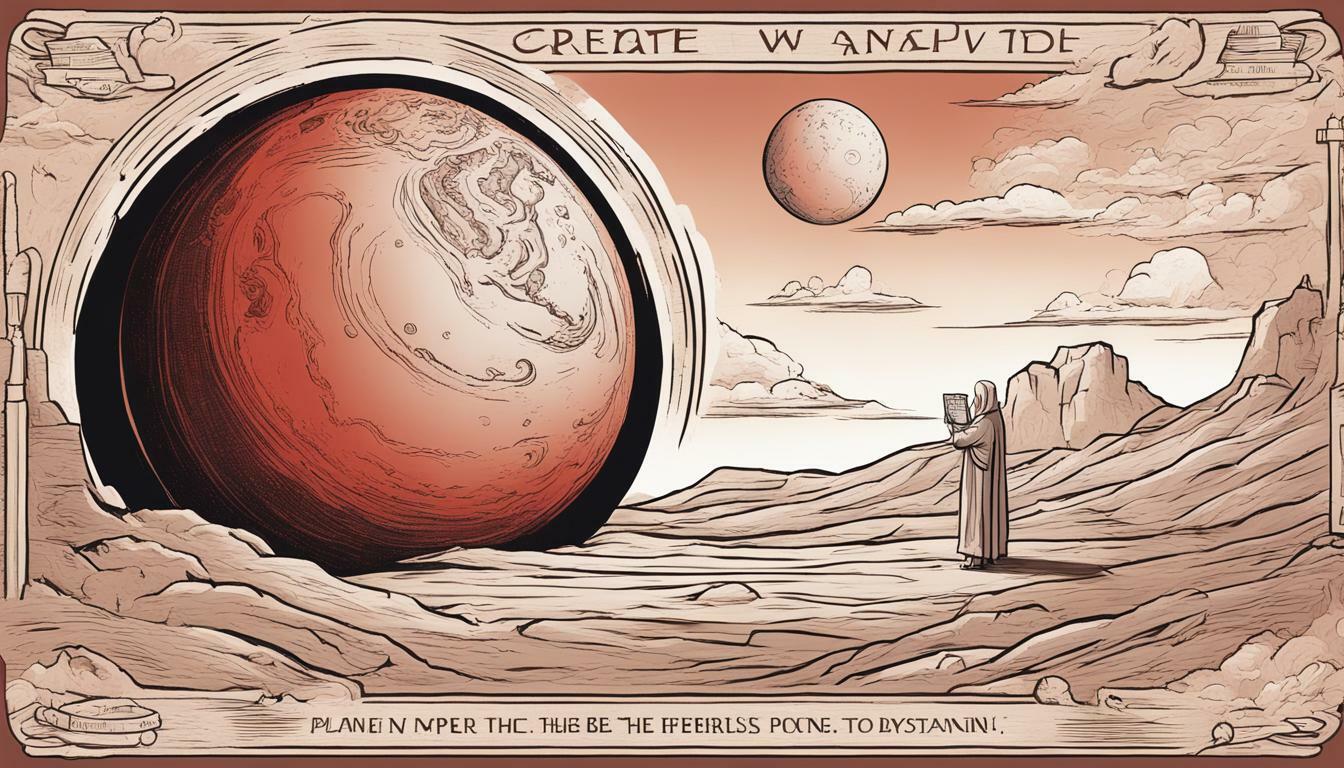For centuries, humanity has been fascinated by the stars and planets that make up our vast universe. One planet that has captured our attention is Mars, the fourth planet from the sun and often referred to as the Red Planet. But what does the Bible say about Mars? Are there any references or interpretations related to this celestial body?
Let’s explore this topic and see what we can uncover about Mars in the biblical context.
Key Takeaways:
- The topic of Mars in the Bible is intriguing, and there may be several references and interpretations related to this red planet.
- By examining the significance of Mars within the biblical context, we can gain a better understanding of its role in biblical teachings.
- Symbolism may play a crucial role in interpreting Mars within the Bible, and understanding this symbolism is critical to our comprehension of this topic.
- While the Bible may not explicitly mention Mars, there may be connections between the creation story and the presence of this celestial body.
- Mars may be seen as a symbol of God’s power within biblical teachings, and there may be biblical prophecies or predictions related to this planet and its role in future events.
- Understanding how Mars was interpreted during biblical times and in ancient Near Eastern cultures can shed light on its biblical significance.
- Finally, considering modern scientific discoveries related to Mars can provide us with a fresh perspective on the biblical view and interpretation of this planet.
Mars in Biblical Context
While the Bible does not explicitly mention the planet Mars, there are several scriptures that may relate to this celestial body. One such verse is found in Isaiah 40:26, which states, “Lift up your eyes on high and see: who created these? He who brings out their host by number, calling them all by name; by the greatness of his might and because he is strong in power, not one is missing.”
This passage highlights God’s power and control over the universe, including the stars and planets. It suggests that God knows each celestial body intimately, even calling them by name and numbering them. This concept is further echoed in Psalm 147:4, which states, “He determines the number of the stars; he gives to all of them their names.”
The Bible also contains numerous passages that describe the heavens and the marvels of God’s creation. For example, Psalm 19:1 declares, “The heavens declare the glory of God, and the sky above proclaims his handiwork.” Similarly, Job 38:7 asks the question, “When the morning stars sang together and all the sons of God shouted for joy?” These verses suggest that the celestial bodies, including Mars, are part of God’s wondrous creation.
“Throughout the Bible, we see evidence of God’s control over the universe, including the stars and planets. While the planet Mars is not explicitly mentioned, it is clear that God knows and names each celestial body, and that they are part of his awe-inspiring creation.”
Understanding the symbolism used in the Bible is crucial when interpreting any references to Mars. For instance, in the book of Revelation, the number seven is used repeatedly to symbolize completeness and perfection. Thus, Mars may be seen as a symbol of God’s power and control over the universe, rather than being viewed as a literal planet. Similarly, the Bible often employs metaphors and analogies, such as describing God as a shepherd or a rock. These literary devices can help us understand the nature of God and his relationship to the world around us.
Overall, while there may not be specific scriptures that mention Mars, the Bible provides a framework for understanding this planet within the context of God’s wondrous and intricate creation. By examining the symbolism used in the Bible and understanding its teachings about God’s power and control over the universe, we can gain a deeper appreciation for the beauty and majesty of Mars and all of God’s creation.
Understanding Symbolism in the Bible
Symbolism is a powerful tool in biblical interpretation, allowing us to better understand the deeper meaning and significance behind certain concepts, objects, or events. When it comes to Mars, we must consider how it might be represented symbolically within the Bible and what insights we can gain from these representations.
One possible symbol for Mars is that of war or conflict. This interpretation is based on the Roman god of war, which was associated with the planet Mars. In the Bible, we see numerous examples of battles and conflicts, such as the Israelites conquering the land of Canaan or David’s victory over Goliath. These stories may be interpreted as symbolizing the ongoing spiritual battle between good and evil, with Mars representing the forces of chaos and destruction.
Another possible symbol for Mars is that of strength or power. In the Bible, we see many examples of God’s strength and power in action, such as the parting of the Red Sea or the resurrection of Jesus Christ. Mars may be seen as a symbol of God’s awesome power and might, reminding us of His sovereign reign over all of creation.
Psalm 93:1-2 says, “The Lord reigns, He is clothed with majesty; the Lord is clothed, He has girded Himself with strength. Surely the world is established, so that it cannot be moved. Your throne is established from of old; You are from everlasting.”
It is important to note that while symbolism can be a useful tool in interpretation, we must also be careful not to rely too heavily on our own interpretations and assumptions. Ultimately, the most reliable source for understanding biblical symbolism is the Bible itself, with its rich history, context, and literary style.
- War or conflict may be associated with Mars
- Mars can symbolize strength or power
- Psalm 93:1-2 shows God’s power and strength
- Symbolism is a powerful tool in biblical interpretation
- We must be careful not to rely too heavily on our own interpretations and assumptions
The Creation Story and Mars
The Bible’s creation story, found in Genesis, describes how God created the heavens and the earth. While Mars is not specifically mentioned in this account of creation, some scholars believe that it may have been included as part of the “heavens” that are mentioned. In Genesis 1:14-18, God creates the sun, moon, and stars, which could be interpreted to include Mars as well.
“And God said, ‘Let there be lights in the expanse of the heavens to separate the day from the night. And let them be for signs and for seasons, and for days and years, and let them be lights in the expanse of the heavens to give light upon the earth.’ And it was so. And God made the two great lights—the greater light to rule the day and the lesser light to rule the night—and the stars. And God set them in the expanse of the heavens to give light on the earth, to rule over the day and over the night, and to separate the light from the darkness. And God saw that it was good.” – Genesis 1:14-18
Furthermore, some scholars also suggest that the red color of Mars may have been interpreted as a sign of God’s judgment in ancient times. While this interpretation is not explicitly stated in the Bible, it offers an interesting insight into how Mars may have been perceived during biblical times.
Mars as a Symbol of God’s Power
Throughout the Bible, God is often portrayed as having power and control over all things, including the planets and celestial bodies in the night sky. While Mars is not specifically mentioned as a symbol of God’s power, it can be interpreted as such through biblical teachings.
One example of this is Psalm 147:4, which states, “He determines the number of the stars and calls them each by name.” This verse emphasizes God’s power and knowledge over the universe, including the planets and moons that make up our solar system.
“He determines the number of the stars and calls them each by name.” – Psalm 147:4
Furthermore, in Isaiah 40:25-26 we read, “To whom will you compare me? Or who is my equal?” says the Holy One. Lift up your eyes and look to the heavens: Who created all these? He who brings out the starry host one by one and calls forth each of them by name. Because of his great power and mighty strength, not one of them is missing.”
“Lift up your eyes and look to the heavens: Who created all these? He who brings out the starry host one by one and calls forth each of them by name.” – Isaiah 40:26
These verses suggest that God has power over all the celestial bodies in the universe, including Mars. While there may not be specific references to Mars as a symbol of God’s power, its presence in the universe and its role as a member of our solar system can be seen as a testament to God’s divine providence and control over all things.
Mars and Prophecy
While the Bible does not explicitly mention Mars in relation to prophecy, some scholars have suggested that certain passages may allude to the planet. For example, in Revelation 6:12-14, it states:
“I watched as he opened the sixth seal. There was a great earthquake. The sun turned black like sackcloth made of goat hair, the whole moon turned blood red, and the stars in the sky fell to earth, as figs drop from a fig tree when shaken by a strong wind. The heavens receded like a scroll being rolled up, and every mountain and island was removed from its place.”
Some have interpreted the “stars falling from the sky” as a reference to celestial bodies, including Mars. However, this interpretation is debatable, and it is unclear if the passage does indeed refer to Mars or any other specific planet.
Despite this lack of explicit prophecy related to Mars, some Christians believe that the study of astrology and celestial bodies is crucial to understanding God’s plan for humanity. In this context, the study of Mars may hold significance for those seeking to gain a deeper understanding of biblical prophecy and the role of celestial bodies in God’s plan.
Mars in Ancient Near Eastern Context
When examining the biblical view of Mars, it is important to understand the context of the ancient Near Eastern cultures at the time. In many of these cultures, including the Babylonians and Egyptians, Mars was associated with war and violence. This is reflected in Babylonian astronomy, where Mars was known as “Nergal,” the god of war and pestilence.
However, in Hebrew culture, there is no direct mention of Mars or any other planets in the Bible. Instead, the focus is on the glory of God’s creation and the majesty of the heavens. This suggests that the biblical view of Mars is less concerned with its specific symbolism and more interested in its place within the larger context of God’s creation.
“The heavens declare the glory of God; the skies proclaim the work of his hands.” – Psalm 19:1 (NIV)
Despite the lack of direct reference to Mars, it is possible that the ancient Hebrews were aware of the planet’s existence through contact with neighboring cultures. However, it is unlikely that they would have assigned the same significance to Mars as other cultures did.
Overall, when considering the biblical interpretation of Mars, it is important to keep in mind the cultural and historical context of the time. While Mars may have held certain meanings in other cultures, the Hebrew focus on God’s creation and power emphasizes the grandeur of the cosmos as a whole.
Mars as a Source of Wonder and Awe
While the Bible may not directly reference the planet Mars, it does speak to the significance of all celestial bodies in the universe. The vast expanse of the cosmos is a testament to God’s power and creativity, and Mars is no exception. As we examine the biblical interpretation of Mars, we can see that it holds a symbolic value as a source of wonder and awe.
Psalm 19:1 states, “The heavens declare the glory of God; the skies proclaim the work of his hands.” This verse reminds us that the beauty and majesty of the universe point to the greatness of its Creator. When we look up at the night sky and see the twinkling stars and planets, including Mars, we are filled with a sense of wonder and humility.
Furthermore, the book of Job describes the wonders of God’s creation, including the constellations and stars. In Job 9:9, it says, “He is the Maker of the Bear and Orion, the Pleiades and the constellations of the south.” This passage illustrates how God’s handiwork extends beyond our immediate surroundings and into the far reaches of the galaxy. It is a testament to His power and creativity.
“The vast expanse of the cosmos is a testament to God’s power and creativity, and Mars is no exception.”
When we view Mars through the lens of the biblical interpretation, we can see that it is a symbol of something greater than itself. It represents the vastness of the universe and the limitless potential of God’s creation. By contemplating the existence of Mars and its place in the cosmos, we can gain a greater appreciation for our own place in the world and our relationship with God.
In conclusion, while the Bible may not provide direct references to Mars, it does encourage us to ponder the wonders of the universe and to marvel at the diversity of God’s creation. Mars serves as a symbol of the greatness and infinite nature of our Creator, inspiring us to look beyond ourselves and into the vast universe around us.
Mars and Modern Perspectives
The study of Mars has fascinated scientists and enthusiasts for centuries. In recent years, advances in technology have allowed for new insights into the red planet. It is essential to consider how these modern perspectives align with the biblical view and interpretation of Mars.
From a biblical perspective, Mars is often viewed as a part of God’s creation, reflecting God’s creativity and power. Modern scientific discoveries can provide deeper insight into how God’s creation operates and may serve to enhance our understanding of the biblical view of Mars.
However, it is important to note that scientific discoveries should be taken in context, and not in opposition to, biblical teachings. The Bible is an essential guide for understanding God’s intentions, and scientific discoveries should be viewed through this lens.
Some modern perspectives on Mars include the possibility of microbial life and the potential for future human exploration. These developments highlight the continued interest and fascination with this celestial body.
While modern discoveries can provide new insights, it is essential to remember the importance of considering the biblical context of Mars. The Bible provides a unique perspective on the significance of the red planet and its role in God’s creation.
Conclusion
In conclusion, the Bible does not directly mention Mars by name, but it does contain several references to celestial bodies and the heavens. While Mars may not have specific biblical significance, it can still be interpreted within the context of biblical teachings.
Through our exploration of symbolism, prophecy, and the creation story, we can better understand the potential significance of Mars in the Bible. It is also important to consider how ancient Near Eastern cultures might have interpreted this red planet and how their beliefs may have influenced biblical writers.
As we reflect on the wonder and awe-inspiring nature of Mars, we can also appreciate God’s creation and the vastness of the universe. Let us keep in mind that while modern scientific discoveries may offer new insights into celestial bodies like Mars, they can also enrich our understanding of the biblical references to the heavens.
In summary, while the Bible may not offer clear answers about Mars, it invites us to broaden our perspective and seek deeper meaning in the wonders of creation. Let us continue to explore and learn from the biblical references to the heavens, including Mars, as we strive to grow in our faith and understanding.




